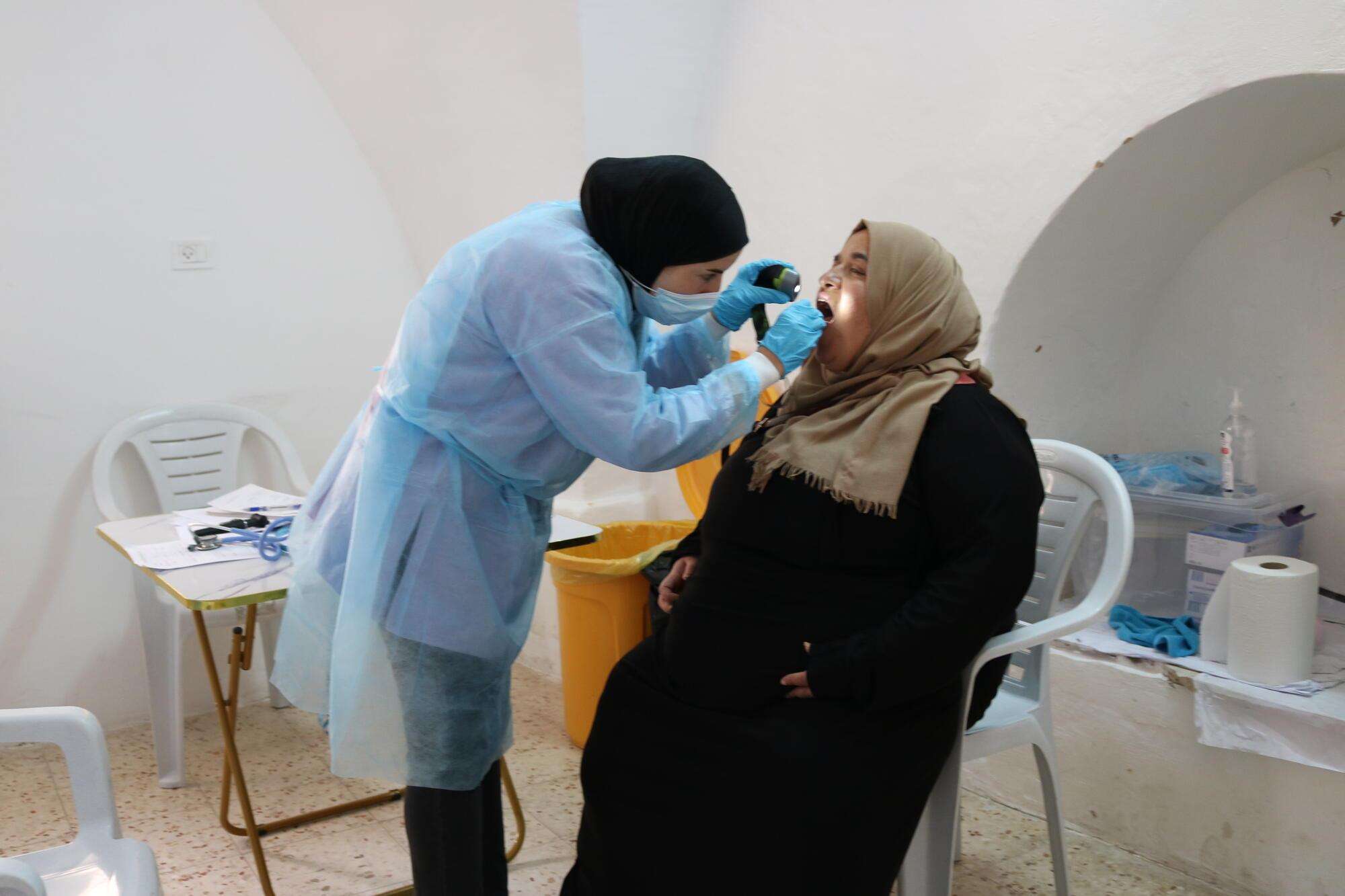Hebron is the second-largest city in the West Bank and one of the oldest in the region. The city's H2 area, which is under Israeli control, is home to about 42,000 Palestinians and 700 Israeli settlers. It is one of the most restricted areas within the West Bank, and has become an epicenter of violence against Palestinian residents. There are 21 permanent checkpoints operated by Israeli forces, and authorities have imposed harsh movement restrictions on Palestinian residents. This severely impedes their access to health care, making it difficult for people to leave the area to seek care and for health actors to enter H2 to provide it.
There is one medical facility in H2 run by the Palestinian Ministry of Health, which provides care to patients with acute conditions. Doctors Without Borders/Médecins Sans Frontières (MSF) is the only medical organization present in H2. Staffed by an all-female team, MSF’s clinic was established in August 2021, and provides general outpatient consultations, sexual and reproductive health services, and mental health care—focusing on women and children.
Without special authorization, Palestinians are forbidden from driving vehicles in H2, which has serious implications for people with disabilities, elderly people, pregnant women, and those who need urgent medical care. “Some patients walk for 30 minutes to reach our clinic because they are not allowed to use cars or other forms of transport,” said Lina Abu Dayyeh, an MSF nurse at the clinic.
The restrictions on vehicles include emergency services such as fire trucks and ambulances. One patient told MSF that her three young nephews were killed in a house fire after Israeli soldiers refused to allow fire trucks to enter H2 to put out the fire, despite the community’s pleas.

Gaza: Reconstructing lives after amputations
Four years after the 2018-2019 protests began, many patients are still dealing with the devastating consequences of their injuries.Multiple security checkpoints
Residents must pass through checkpoints to access health facilities outside H2. When clashes occur between Palestinian residents and Israeli settlers or with the Israeli forces, checkpoints are often closed, which prevents residents from being able to leave or enter the area.
“I can’t go to my doctor for regular pregnancy check-ups,” said Lana*, a 23-year-old resident of H2 who is nine months pregnant. “Every day there are clashes near the checkpoint where I exit [H2] to take a taxi. [It’s] difficult for me to walk all the way to the checkpoint—it’s [a] 20-minute walk at least. My family can’t visit me here because of the checkpoints. I live in a state of constant worry, stress, and fear.”
Palestinians living close to Israeli settlers in H2 often can’t move around freely within their own neighborhoods either. Access to certain streets is prohibited and there are multiple security checks in operation. Some people have to pass through four checkpoints to reach MSF’s clinic, while others are unable to access it at all.
The toll on mental health
The situation in H2 is detrimental to the psychological well-being of Palestinian residents, both adults and children. Many Palestinian homes are subjected to nighttime incursions by Israeli forces. According to a United Nations survey, 75 percent of Palestinian households in H2 were searched by Israeli forces between 2015 and 2018, and during one third of these searches, a member of the family was physically assaulted. During the same period, one in every five households surveyed reported having a child arrested by Israeli forces.
“We suffer a lot in our lives,” said Salma*, a 41-year-old resident of H2. “The Israeli forces and settlers raid our houses so often. All the time I am scared that my kids might be hurt by the soldiers or the settlers. I live in a state of constant anxiety. Sometimes, when the [Israeli soldiers] see my son on the roof, they call to him to get down and they threaten that if they see him on the roof again, they will shoot him.”
Adults often present to MSF’s clinic with moderate to severe mental health conditions, including depression, anxiety, and difficulties in interpersonal relationships. “I live in constant fear that my kids might be hurt,” said Salma. “I’m afraid to go anywhere in H2 on my own. I wouldn’t have come to the MSF clinic today if my sister hadn’t come too.”
Anxiety in children
MSF’s medical staff often see signs of anxiety in the children they treat. Anxiety can affect children’s interactions with their families and with other children. “While my daughter was playing in the park, they fired teargas bombs,” said Lana. “[She] was terrified and couldn’t breathe from the teargas. If you asked her to go to the park now, she wouldn’t agree to go. She’s four years old and she still uses a pacifier because of her unstable mental state.”
MSF scaled up services in October 2021, resulting in a steep rise in the number of patients seeking medical care at the clinic. Between August 2021 and May 2022, MSF treated 5,135 patients, approximately half of whom were children under 15. In that same period, the MSF team provided psychological care to 989 patients.
However, the high mental health needs far outweigh MSF’s capacity. MSF has called for longer-term solutions for the residents of H2, including an increase in medical services and bringing those services closer to where people live. “People here need more attention,” said Salma. “We want to be able to live normal lives.”
“H2 is the worst representation of the daily suffering of the Palestinian people living under occupation,” said Marietta Provopoulou, MSF head of mission in the Palestinian Territories. “MSF does not just seek to provide health services in H2; we want to remind people that they deserve to be respected and treated with dignity.”
*Names have been changed.




